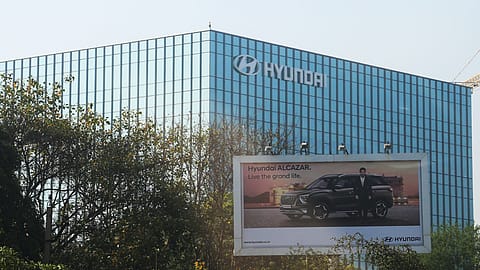EV import scheme may affect business: Hyundai
The scheme to promote manufacturing of electric passenger cars in India will intensify competition in the industry, says Hyundai Motor India in its DRHP ahead of IPO.

The government's new scheme to promote manufacturing of electric vehicles in India with a reduced import duty of 15% may impact Hyundai Motor India Ltd's sales due to an increase in competition, the South Korean carmaker says in its draft red herring prospectus filed with market regulator Securities and Exchange Board of India (SEBI).
To attract major global players, the Government of India approved the Scheme to Promote Manufacturing of Electric Passenger Cars in India (SPMEPCI) on March 15, 2024. The new policy slashes import duty to 15% from 100% for EVs with cost, insurance and freight value of $35,000 or more.
"This may impact our sales due to increase in competition which could affect our margins, business and results of operations," Hyundai Motor India says in its draft red herring prospectus.
This policy will enable foreign OEMs to set up manufacturing bases in India, and also enter the domestic sales market, which will also intensify competition in the industry, India's second-largest carmaker by volume says.
Under the new policy, automakers are required to invest at least ₹4,150 crore or $500 million to set up a new EV manufacturing facility in India within three years. A localisation of 25% is to be achieved by the third year and 50% by the fifth year.
The duty foregone on the total number of EVs allowed for import would be limited to the investment made or ₹6,484 crore. A maximum of 40,000 EVs at the rate of not more than 8,000 per year would be permissible if the investment is $800 million or more.
Electrification in the passenger vehicle segment is still at a quite nascent stage in India and there is a sizeable scope of expansion going ahead, says the South Korean carmaker.
Recommended Stories
Hyundai, however, says the biggest challenge faced by the EV industry is the dependencies in the EV manufacturing supply chain. "The industry continues to rely on imports of critical parts including motors and batteries. The current domestic supply chain still needs to advance before it becomes 100% indigenous," the carmaker says.
"One of the major hurdles in adoption of EVs in India is the unavailability and slow development public charging infrastructure. Currently India has limited number of chargers in national highways, state highways and public places. This poses a threat to mass scale adoption of EVs in the country," says Hyundai.
Hyundai further says that Corporate Average Fuel Economy (CAFE) norms are expected to incentivise the shift towards greener technologies such as hybrids and electric vehicles (EVs).
The Energy Conservation Bill requires carmakers to pay ₹25,000 per unit if their fleet’s CO2 emissions exceed the intended CAFE score of 0-4.7 g/km, and ₹50,000 per unit if they exceed by more than 4.7g/km.
(INR CR)
Hyundai plans to launch four EV models including the Creta EV in the last quarter of the ongoing fiscal. "We are following a transition strategy having started with the launch of high-end, premium EVs and plan to transition towards the mass markets as the EV market and ecosystem scales up in India," the carmaker says.